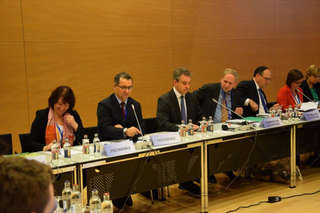 A meeting of the Directors General of Vocational Training was held in Luxembourg on 16 and 17 November 2015 in the context of the Luxembourg Presidency of the Council of the European Union.
A meeting of the Directors General of Vocational Training was held in Luxembourg on 16 and 17 November 2015 in the context of the Luxembourg Presidency of the Council of the European Union.
The Minister for National Education, Childhood and Youth, Claude Meisch, first of all referred to the complex and difficult international context relating to the refugee situation. Claude Meisch believes that it is necessary to prevent a considerable humanitarian disaster through the cooperation of all EU countries. The work of the European Training Foundation (ETF) has shown that in the countries bordering on the European Union, vocational training and education generally contribute actively and sustainably towards integration and social peace within our societies.
Moreover, a workshop for the Directors General dedicated to that issue was held during the meeting. The workshop highlighted the importance of finding more flexible ways of recognising and validating the learning achievements of new arrivals. In that regard, learning the languages of the host country is also key. The participants stressed the need for European cooperation in this context which can be strengthened with the establishment of a European platform for the exchange of best practices. The aim is to give migrants opportunities within society through programmes offering specialised support, thereby preventing segregation.
The aim of promoting equality, social cohesion and active citizenship is one of four strategic objectives of the strategic framework for European cooperation in education and training (ET 2020). ET 2020 seeks to improve the basic skills (languages, sciences and maths) of some young people, as well as adults, in order to significantly reduce youth unemployment and prevent school dropouts and increase the numbers of graduates.
Professor Tanya Sammut-Bonnici from the University of Malta addressed the impact of the sharing economy and the Internet of Things on human capital and required professional skills. Representatives from the Centre de gestion informatique de l’éducation in Luxembourg and the German Federal Ministry of Education and Research set out the framework of vocational training in schools for the purpose of pedagogical development, as well as a pilot project in Germany entitled 'VET 4.0' which proposes the creation of new structures for vocational training, incorporating virtual learning and combinations of different educational facilities and hybrid educational paths.
In fact, there is a shortage of IT graduates ─ a field which is revolutionising our world if we consider that, in 2020, 25 billion smart appliances will be connected to the internet and will be controlling different aspects of our lives. In that regard, advanced IT skills and programming, in particular, are fundamental in order to maintain European competitiveness. On the other hand, social partners highlighted the challenge of encouraging self-employment, which also requires the provision of suitable social security models.
The meeting of Directors General was followed by a conference entitled 'Youth and VET: reach out and move!' on 17 and 18 November. This conference brought together experts from all Member States. Amongst other things, the experts addressed the possibility of working together with youth workers who often have more direct contact with disadvantaged young people or those with difficulties. In particular, this includes building relationships based on trust with the various integration professionals and identifying effective ways in which to support youth employment.

